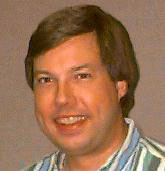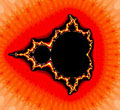|
Craig Peterson
–
mathematician
|

|
"
I think that all creative people need sources of novelty in their lives, to keep stretching their mental capacities in different ways.
" |

|
| |
|
|
|
| |
How were you motivated to choose your particular field? |
| |
I grew up in a well-educated household, and education was always emphasized as important by my parents. Education opportunities had allowed both of them to leave the farm life in which they had been raised, but that neither of them enjoyed. The GI bill and scholarships led my father to an MBA and CPA; my mother was a registered nurse. My father taught at the local liberal arts college, and our neighbors were all highly educated, even those that weren't affiliated with the college. So my earliest years were suffused with the aura of academia. I remember sneaking out of bed to listen at the door to the living room, just to hear the learned conversation of my parents and neighbors at one of my parents' frequent evening coffee parties. Education and learning in general were always a big motivator in my early years, reinforced by my parents' attention and praise, along with numerous educational toys and workbooks. (There were actually times when I looked forward to rainy days, because I knew Mom or Dad would pull out one of the activity books they always seemed to have on hand for such an occasion, and the hours would fly by.)
As my father was an accountant, I naturally wanted to learn about all these numbers, and master the mysterious (at least to a four-year-old) adding machine. With my parents' help and guidance, I knew my counting numbers and addition up to 1000 before I started school. I also knew the multiplication tables for all the single digit numbers. I remember sitting with my father out in our little fishing boat, and him drilling me on my two-digit-multiplication tables while we fished. Having an older sister to compete with added to my ambition, and I quickly discovered that my talents in this area were actually stronger than hers.
One of the things that drew me to mathematics was its total lack of ambiguity. Answers were always either right or wrong, no debating or arguing allowed! It didn't matter how many learned opinions you could quote, either the proof was true or it was false. This rigor in reasoning strongly attracted me, and I never cared for rote memorization of facts and opinions. The idea that you could deduce most of mathematics from a limited set of assumptions seemed to me extremely powerful. (Even if, as I eventually found out, there are limits to a purely deductive approach.)
It didn't hurt that I was very good at "seeing" my way through to the answers to math problems. As I grew older and learned more advanced subjects such as algebra and geometry, I became aware that I had my own way of working things out in my head that didn't always follow the approach that I was taught. In most cases, the "form" of the answer to a problem would just pop into my head, sometimes with the precise answer attached, sometimes requiring a little pencil work to draw out the right answer. But I could always construct the appropriate mathematical steps to link the answer back to the problem (or vice versa) so I knew my "intuition" was correct.
As a result, doing math homework was always a snap. My ability was sufficiently obvious that I was frequently sought out in both high school and college to tutor friends and acquaintances in math. My interest in math even led me to the related field of computer science, whose basis in binary arithmetic and logic seemed familiar and comfortable to me. Physics was also a prime attraction to me, due to its reliance on advanced mathematical concepts and methods, just as analytic philosophy was, due to its reliance on logical thinking. But mathematics always seemed the most pure, the least corrupted by human influence. Sometimes I feel that mathematics is the only thing in the universe that is really "real."
|
|

|
| |
|
|
|
| |
What can you share about your creative process? |
| |

|
|
As you may have noted in my story above, when it comes to abstract problem solving, the answers usually just appear, sometimes first as a feeling (something too abstract to represented in words or pictures), but rapidly take form beneath my pen or pencil. (I used to do my college math problems in ink, instead of pencil, as I would rarely have to go back and correct a proof.) But this probably isn't too helpful, so I'll share a few tactics that I have developed to help me from time to time.
First, make sure you're solving the right problem. In real life, problems seldom are presented as precisely as in a textbook. Extraneous information frequently clutters the problem statement, and sometimes the person who wants you to solve the problem has difficulty expressing it in precise terms. So the first thing I usually do is restate the problem in the most rigorous fashion I can, eliminating anything that isn't central to the problem. Then, if it's for someone else, I go over the restatement with them, to make sure I've captured the right problem. (This may take a couple of iterations, sometimes with solutions attached, in order to get to the "real" problem.)
Another technique I've learned is to give my subconscious or unconscious mind some quiet time to work "in the background". This means putting away the problem that I'm working on and doing something else, usually something completely different. For me this includes listening to music, watching TV or a movie, having a social evening with friends, or just taking a nap. I find that the usual reason I have trouble solving a problem is because I'm stressed out or tired. Taking a break almost always causes the "light bulb" to turn on when I get back to the problem. I'm probably at my most productive the month or so after I get back from vacation.
Finally, I think that all creative people need sources of novelty in their lives, to keep stretching their mental capacities in different ways. For me it's primarily music, acting, and gourmet cooking, with hiking and art not far behind. I also believe that a certain amount of balance in life is healthy and improves my ability to enjoy what I do and not suffer from burnout.
|
|
| |
|
|
|
| |
What ideas do you have for a future human community on Mars?
|
| |
This one "popped" into my head over the weekend. A budding Mars colony needs to have at least some of those things that provide the much needed novelty I mentioned above. Therefore, the colony should build a combined greenhouse/concert hall/art gallery, so that people can engage in activities that improve the quality of life for the colonists. The reason for combining these is that a growing colony would need to plan for more people, so it would be logical to build a greenhouse much larger than initially needed. The rest of the space could then be used as an art gallery and concert hall. By the time the colony grows to where it needs all the space for gardening, it should also have the resources to build a dedicated building for the arts.
It may take a while before mass budgets allow the luxury of canvas and castanets, but musical instruments could be constructed out of leftover containers and construction material. Likewise, sculptures, collages, and other "assembled" artwork could be created. With 100 colonists, dozens will certainly have talents in these areas - all that remains is the time and encouragement to express these talents. (Actually, it might be impossible to stop them.) Just as our pioneer foreparents had quilting bees and barn dances, the pioneers of future Mars outposts will also entertain themselves (and perhaps by recording or broadcast, those of us back on Earth.) That and the 1000 or so TV channels we should have by then should help preserve the mental good health of our future Mars colony.
|
|

|
|




